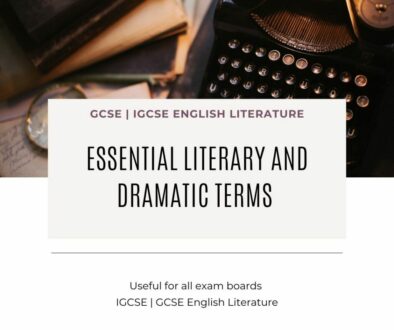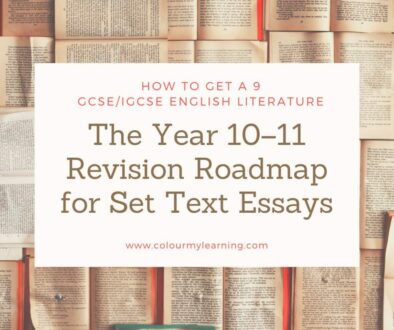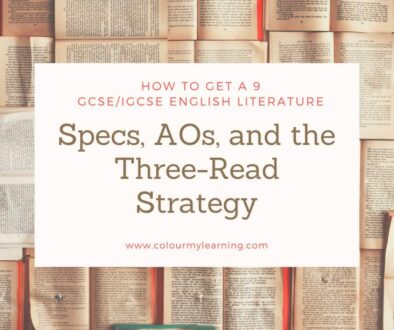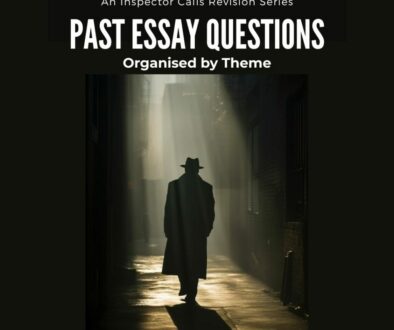How to Get a 9 in GCSE/IGCSE English Literature (Part 3): Practice, Essay Planning, and Writing Skills
Once you know your texts well and have a good sense of what examiners reward, the next step is practice. The kind of practice that builds Grade 9 skills is deliberate and regular. Students who reach the top grades develop habits of planning, timed writing, and checking their work against examiner expectations.
In this post we outline a step-by-step approach to building your confidence and skills in essay writing at the grade 9 level. This is Part 3 of a series of 3 blog posts on How to score a 9 for your English Literature exam at GCSE/IGCSE level. Part 1 Outlines the basic preparation of getting to know the syllabus intimately, knowing what AOs you need for each question and finding out how examiners mark. In Part 2, we focus on how to allocate your time over the year or over the months leading up to your exam. Part 3 focuses on how to practise essay writing effectively and efficiently.
Why Practice Matters
If you are an athlete, a musician or a dancer you will already know that practise makes all the difference to your skillset, stamina and ability. While some things come naturally, in the long run, success is achieved by dedication, hard work and practise. It is no different for essay writing.
English Literature essays are not difficult to pass by any means. The overarching ideas and arguments are mostly straightforward and easy to outline. However to work at the grade 8 or 9 level, requires a more concerted and analytical approach. This starts first with being able to plan an essay quickly and effectively.
Step-wise Essay Planning Practise
All strong essays begin with a strong plan. A plan does not have to be detailed nor contain every bit of information but it does have to be clear and you need to be able to use it to formulate the progression of your thoughts into a clear and coherent argument. Being able to plan quickly gives you an advantage in the exam room. Once you have your plan written down, check to make sure it answers the question before writing the full essay.
Know what the question requires
English Literature unlike most other subject exams, has a significant amount of lee-way in how you make your arguments. There are no true rights or wrongs, when writing your essay. In a way, this makes it hard to be certain that the points you make are truly what is needed. But this is also how you can turn a good essay into a strong one that allows you to play to your own strengths.
It is very important to understand and be certain about what the question is asking for. Here is what we would recommend that you do:
- Read the question clearly before you read the extract (if applicable), or before you start considering your points.
- If it is an extract based question, annotate the text with the question in mind. If not, read the question, at least 3 times, each time jotting down related notes from the text under question.
- Be clear what your central argument is. This is the overarching response to the question itself and needs to be used to frame each supporting point.
Write five-minute outlines
A really good way to practise outlining is to set a timer for five minutes and choose a past exam question. (We have collated all the Edexcel IGCSE English Literature questions here).
- For each question, get to the core of what the question requires.
- Then write your main argument. This should answer the question directly.
- Following that write three-four points that support your argument, and
- Finally fill in a quotation for each.
Use bullet points to quickly jot down your thoughts. Try to do at least 2-3 questions in one sitting. These quick outlines strengthen your ability to think fast and stay on track. Once you’re done, and happy with what you’ve managed time-wise, review your outline and see if you can strengthen it any further.
👉 Parents can act as timekeepers here. Offer a question, set a timer, and ask to see the outline at the end. Supporting the habit matters more than knowing the text.
Flex your quote muscles
To become really familiar with your favourite quotes and to learn all the ways in which you can apply them practise writing two or more quotes for each point. Some quotes may apply to more than one point. Some are stronger when used in conjunction with specific contexts or situations.
Try to answer the same question twice using different quotations. For example, with a Macbeth ambition question, one plan might use “vaulting ambition” and “Stars, hide your fires,” while another uses Lady Macbeth’s “unsex me here” and “We will proceed no further in this business.” This exercise widens your options and strengthens your adaptability in knowing and using your quotes.
Practise different question types
Most past exam questions are asked around clear themes. Occasionally they may ask a more technical question, sometimes it is something relating to the staging of a play, or the perspective of the author. Going through past exam questions to give you greater opportunity to understand the style of the question and truly examine how your response can be built.
As you practise writing your essay plan, rotate through different types of questions.
- Character-focused (How is Sheila presented in An Inspector Calls?)
- Theme-based (How is ambition shown in Macbeth?)
- Extract analysis (close reading of a passage)
- Whole-text questions (overview of themes or comparisons)
Each question type asks for a slightly different approach. By practising them all, you prepare for every possibility. While you may have options to choose between two questions, as you are practising, try to write outlines for all questions that you meet. You will find that you are naturally drawn to a certain style of question above the other, but getting familiar with both allows you to have the option during the exam itself.
Progressive Essay Writing Practice
As your ability to plan and outline feels comfortable and confident, begin turning those outlines into essays. Ideally, build this skill step by step.
Foundation Essays (Untimed)
These first practise essays may be quite rough to begin with, but that will definitely improve over time.
- Using your outline, write without a timer at first.
- Focus on following your outline and maintaining a clear structure
- As you write, consider the analytical depth of your topic statements and how you can back each with further explanation and appropriate quotes.
- Work to ensure that your writing style and voice is consistent throughout the essay.
Write your essay in one sitting. This may initially take a bit longer as you begin to get used to how to build and expand your thoughts and points into paragraphs and then the whole essay.
Building Speed
When you are more confident in your writing ability, start timing yourself as your write the essays.
1. Start with 60 minutes for each essay.
2. Gradually reduce to the recommended exam timing, usually 45 minutes. Check with your past exam question paper.
Exam Simulation As exams approach, work to complete entire papers under timed conditions. Use a desk, a timer, and no extra resources. This will help you develop the stamina to write 2 -3 essays in one sitting. It will also reveal any issues you may have with pacing or essay length.
👉 Teachers can support this with mini mock exams. Parents can create exam-like conditions at home by setting a timer and providing a quiet study space.
Self-Assessment Using Mark Schemes
As you practise outlining and writing essays, make use of resources provided by the exam boards to identify what makes a good essay and how essays are marked. Essay writing improvement comes from reflection. To progress, you need to measure your work against examiner expectations and standards.
Use Official Mark Schemes
Download official mark schemes from your exam board. After each essay, read the grid and decide honestly which descriptors match your work.
Read Examiner Reports
Examiners publish annual reports that explain what high-scoring answers achieved. They also describe habits that limit marks. These insights will help you aim higher and understand where you might pick up extra marks.
Create an AO Checklist
Turn the AOs into a checklist and understand how they are marked against each question. The AOs are not all examined in every exam question. Some require AO 1 and 2, some require a bit of context. Get to know the AOs intimately and know what you need for each question. Although every exam board assesses for similar AOs, each of them are listed differently. For example, Edexcel IGCSE lists context as AO4, while for AQA context is AO3.
Then as you are assessing your own answer, ask yourself (example below is for AQA)
* Did I use enough quotations? (AO1)
* Did I analyse techniques clearly? (AO2)
* Did I use context briefly and with purpose? (AO3)
* Was my writing accurate and clear? (AO4, if relevant)
Mark what you achieved and note what to you need to work on and develop next.
Compare with Exemplars
Examine and read in detail Grade 8/9 essays. Notice how they begin with a clear argument, select precise quotations, explain how the writer’s language works in relation to the exam question. Grade 8/9 essays also make use of evaluative phrases such as “This also suggests…”, which shows that you have engaged and are able to form firm and conclusive judgements of the text in answer to the question. At GCSE/IGCSE level, strong essays end with a conclusion that reiterates the answer to the question fully.
Based on what you note and observe from the sample essays, set yourself one or two goals as to how you can improve on your own essay writing..
Final Word on Practice
Grade 9 essays grow out of repeated, consistent, focused practice. As you outline develops your ability to plan. Each timed essay strengthens your control and confidence under pressure. Each self-check moves you closer to examiner expectations.
Treat your essay writing practice as training. Every step builds skill and confidence. Over time, your essays will feel sharper and more controlled, and examiners will recognise the qualities that belong in the top band.










